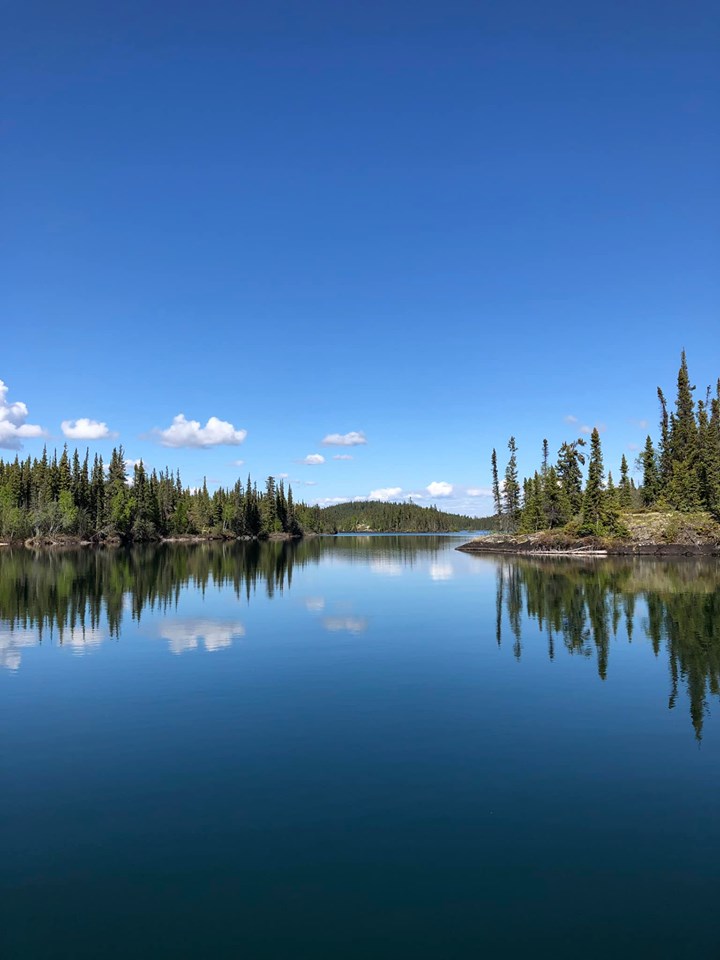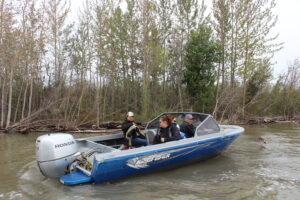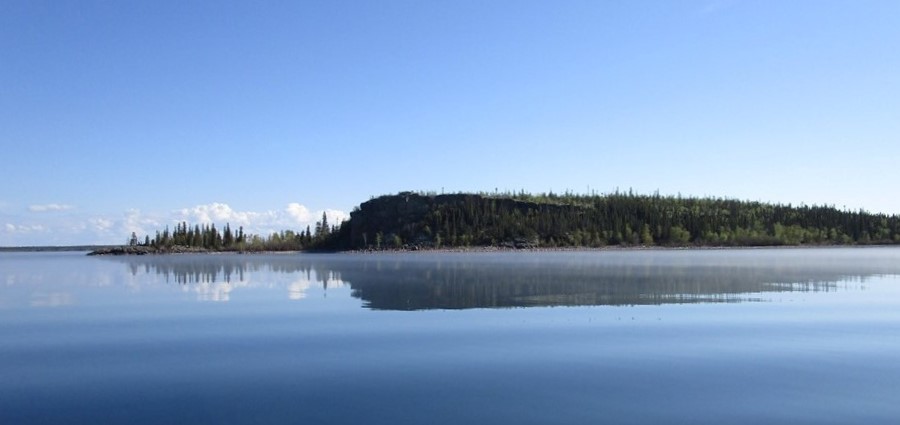Waking up, I see the morning is shining brightly; rubbing my eyes, I step out to the porch deck, the birds sing noisily but cheerfully. It’s early July and school is out for the summer. Just finishing grade five, I am ten years old. I enjoy the summer months; soon we leave for our summer fish camp. I listen and try to recognize the bird species by their sound. The trees of poplar, spruce and birch stand tall and are alive with birdsong. I recognize a robin as it lands on the hillside near our house. My mother brings out a cup of tea with milk for me to sip on, I watch the robin bobbing through the grass looking for earthworms. Mom looks to the sky and says, “It’s going to be a hot day”, she wipes the beads of sweat forming on her forehead and goes back into the house to finish cooking breakfast over the woodstove.
I watch the robin; these birds chirp a proverbial sound that fills the air in bright summer mornings. I remember my father telling me that if I search for birds’ nests, not to handle the little light blue robin eggs nested in the trees and willows. “If you touch the little eggs, the mother will abandon her nest and the birds won’t hatch,” he warned.
Sipping on the tea, I decide to sit on the porch deck and listen to all kinds of birds and enjoy the warm sunlight. Our neighbour calls to her children, who are out playing, to come into the house to have their breakfast. For some reason, I think of our science teacher. Before school ended, she challenged the students to work on a summer project and report on what we chose when we return to school in September. Well, this was as good a time as any to begin my project. I would learn birdwatching, something I heard about but hadn’t indulged in that activity before. Unexpectedly, up on the hill, a red-headed woodpecker is heard knocking on a tree, it stops briefly and lets out a raucous cackle and goes back to the task. Seagulls are now soaring overhead. I find it a bit tricky to describe the sounding of seagulls. I challenge myself to do so. “Ok, let’s see,” I say to myself and begin listening carefully; not to be disturbed by the other birds chirping and chattering.
I go into the house to retrieve my backpack from under the bed and pull out my school notebook and return to the porch deck, pen in hand, I begin writing: “Seagulls make a lot of noise, lots of chatter, almost like choking calls. I throw a piece of bannock to the ground, a seagull lands and swiftly waddles to it, quickly nabs it and swallows. He turns around to look at me, waiting for another offering. Other seagulls land and walk away from each other. My seagull leans forward and puts his head down before raising it quickly and delivers a call, as if to gesture his demand for another offering.” Mom comes out and says breakfast is almost ready. She comments that the seagulls are the noisiest at this time of year. “It’s because their chicks left their nests and the parents are calling out to them”. I gladly integrate that observance to my notes.
Listening for other recognizable bird sounds, sparrows and finches are heard chirping wildly in the nearby willows. I decided to write that my favourite bird is the loon: “Our family goes by boat every summer to our fish camp. After dinner, I go to rest in our wall tent, the smell of spruce boughs under a tarp acts as a dry floor, the fragrant is strong but I like it. Meanwhile, the rest of the family sit out by the open fire pit. The adults are relaxing drinking ‘Bush Tea’. The taste has a smoky flavour because it’s made over an open fire. Late at night, as we bed down, we hear the beautiful wavering and haunting calls of the loons swimming out on the lake, the sun is over the horizon, it’s dusk. “I think the loons are letting us know that they’re out there,” say quietly. I lay to listen, and fall peacefully asleep”.
Now, at the fish camp, I have my notebook in my backpack and begin to do my observances of the birds. We have a pair of binoculars, my siblings create disputes over who should be using it, but my mom knows I have a summer project to do and hands me the binoculars. “How come he’s always the one that gets to use it anyway?” says my younger disgruntled brother. It‘s explained that I have homework for the summer and will submit a report when returning to school. Mom said that I chose birdwatching – no arguments.
We awaken to the sound of a raven busily squawking up a tree behind the tent. A squirrel chatters angrily at it. I lay in bed to take in the raven’s different kinds of calls. It shifts from harsh shrills to low, gurgling croaks. I count the different categories of the raven’s sound to put into my notebook later. The shadows of tree branches and leaves make a pleasing dance across the ceiling and walls of the canvas tent. The family has breakfast and out near the shoreline of the beach, a group of Mallard ducks are swimming, dipping their heads into the shallow water. My uncle, who joined us this summer, tells me that he likes the idea of my summer project. He says it’s the female ducks that quack louder than the males; clenching my piece of bannock in my teeth, I put that into consideration in the notebook. I watch as the Mallards swim. I note that it’s green head is above a white neckband. It’s chestnut-coloured with a body shade of gray. My uncle, who is a hunter, shares that the females are browner in colour. He tells me to note the patches of glittering purple-blue wing feathers on their sides. I like that he has taken interest and is teaching me some bush skills.

High above us a bird soars letting out a highly-pitched screeching sound. “That’s an eagle,” says my uncle. “In Denesuline, we call eagle “Det’ąni Chogh” (pronounced “day tt an nee choke”). It means ‘Big Bird’ and they have powerful eyes, like the glasses on your binoculars”. He adds that eagles can see fish, ducks and small animals like mice from high above. I write in my notebook, that eagles are fearless and that they are ‘rulers of the sky!’ My uncle smiles and agrees.
He invites me to head down a trail to a small lake where there are other birds. With rifle in hand, he says it’s just in case of any danger, I have the binoculars. We walk along, bird sounds are heard, it isn’t too recognizable for me. My uncle quietly says, “Those birds are called grebes but you probably never saw one, come, I’ll show you, but be real quiet and don’t move too fast”. We slip into the willows near the shoreline , and there, at the edge of the shoreline, he points and whispers, “They’re feeding on minnows”. Peering at them though the binoculars, I reveal that the grebes have long legs and short tails. I am told that grebes are not to be hunted.
That summer, in 1962, was the first time I seriously attempted making real observations of all kinds of birds, including the songbirds. It brought me closer to the land and I learned from nature . I presume that it is because of the relationship I had with the land as a youngster, that I enjoy working with Canadian Parks and Wilderness Society, Northwest Territories chapter (CPAWS-NWT) today. I continue to learn about and appreciate t bird species and connecting with the natural world every opportunity I get. For me, being in the bush, hiking out on trails, canoeing on lakes and rivers and camping are the real motives for returning north – returning home.
In 2020, I plan on doing more nature-based activities, especially in the spring, summer and fall months. I may not be a serious bird-watcher but I will enjoy listening to birds sing joyfully whenever I can. Though from a conservation perspective, I find it distressing to realize that songbirds are so few these days as compared to my youth; I notice that bush trails are at times void of them; we must give our migratory birds the protection they need. CPAWS-NWT encourages the public to get out on-the-land, enjoy the sites and sounds, build a personal appreciation and connection with nature. It is often our own experiences in nature that compel us to take greater care of ecosystems and biodiversity, including birds.Hopefully, all species of beautiful, inspiring songbirds will continue to be a vital component of the northern ecosystems into the future.
![CPAWS NWT Logo [Transparent Background] CPAWS NWT](https://cpawsnwt.org/wp-content/uploads/2018/09/CPAWS-NWT-Logo-Transparent-Background.png)


